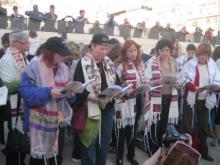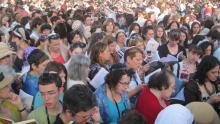Judaism
PREACHERS, politicians, and other public speakers know that a story is often the best way to get a point across to their listeners. In his itinerant ministry, Jesus was no exception. Some of his most important teaching was contained in stories—parables. Yet often we do not take them seriously enough to seek what he was really saying. Two thousand years of Christian theology has also obscured his original intent, often by considering them to be allegories rather than stories.
In that process, anti-Jewish stereotypes and prejudices have too often come to dominate the interpretation of the parables. Any villain is seen as representing Judaism, while the hero or victim represents the church—and, of course, in this framing God is on the side of the church. This often-unconscious bias affects how we read and understand the story and obscures Jesus’ message.
Professor Amy-Jill Levine, in Short Stories by Jesus, aims to correct that. As a Jewish New Testament scholar teaching at a Christian divinity school, she is uniquely situated to place Jesus and his teaching in their historical and cultural context. Jesus was a first-century Jew speaking to other first-century Jews. If we do not understand that starting point, we cannot understand Jesus or his stories. In an introduction not to be skipped, she points out that the parables often echo themes that appear elsewhere in Jesus’ teachings: economics, relationships, and, most important, prioritizing life in expectation of the coming kingdom of God. To make his point, he uses common, everyday examples of real-life characters and situations his audience would recognize.

What does a map of the U.S. religious landscape look like in 140 characters?
A new study of Twitter finds that self-identified religious users are more likely to tweet to members of their own faith than to members of a different one. The study examined people whose Twitter profiles identified them as Christian, Jewish, Muslim, Buddhist, Hindu and atheist.
And while adherents of all six groups studied tweet frequently, atheists — among the smallest populations in the U.S. — are the most prolific.
“On average, we can say the atheists have more friends, more followers, and they tweet more,” said Lu Chen, a doctoral candidate at the Kno.e.sis Center at Wright State University who co-authored the study with Adam Okulicz-Kozaryn of Rutgers University-Camden. They will present their findings in November at the sixth annual International Conference on Social Informatics.

Some called it “The Great War.” Others called it “The War to End All Wars.” History proves it was neither.
As the world marks the 100th anniversary of the outbreak of World War I — a conflict that left 37 million dead or wounded and reshaped the global map — a number of scholars and authors are examining a facet of the war they say has been overlooked — the religious framework they say led to the conflict, affected its outcome and continues to impact global events today.
More than that, they argue, today’s religious and political realities — ongoing wars, disputed borders and hostile relationships — have their roots in the global conflict that began when Austria-Hungary declared war on Serbia on July 28, 1914.
"Here's how you bring light into the world," says a scruffy-bearded man in shirtsleeves and a knit cap on a Brooklyn rooftop. "First, you get up in the morning and you scream!" His mischievous grin melts into something more ethereally content as he screams. At length.
He's had plenty of practice screaming — he does it for a living.
The man is Yishai Romanoff, lead singer of the hassidic punk band Moshiach Oi and one of the half-dozen artists, activists, and culture-makers profiled in the documentary Punk Jews.
The phrase can seem like an oxymoron: The essence of punk is to challenge inherited convention, yet adherence to rich traditions of convention is the common through-line of all of Judaism's myriad flavors.

THE SHOOTINGS THAT took three lives this spring at a Jewish community center and retirement complex in Kansas are a reminder that deadly strains of what is usually called “anti-Semitism” remain with us. The fact that the shooter was a deranged white supremacist should not prevent us from coming to terms with the roots and survival of Jew-hatred in our culture.
Anti-Semitism is a made-up word that itself gives clues to the history of Jew-hatred in our civilization. The term was coined by German journalist Wilhelm Marr in 1879, one of a number of Jew-haters who were turning longstanding European Christian hatred of Jews into something modern and racial. The “Jewish problem,” therefore, became the “fact” that there was a racial group, the “Semites,” who were a mortal threat to another racial group, the “Aryans,” and therefore needed to be removed from Aryan societies. All right-thinking Germans/Europeans/Aryans, the argument went, needed to unite to combat the Semites through a scientific antisemitismus. The term is usually written “anti-Semitism” in English, but that usage profoundly reinforces the racist myth that there is a race of “Semites” needing to be opposed by “anti-Semites.” The term Jew-hatred is better because it refuses to participate in this mythology.
Modern racialized Jew-hatred flowed into the 20th century and crystallized most disastrously in Nazi Germany. There, over 12 terrible years, the 19th century anti-Jewish program was enacted, and then exceeded. Jews were to be “eliminated” from among the “Aryans,” a program that became annihilation after 1939, with 6 million Jews murdered.

The first ever global study of anti-Semitic attitudes shows that more than a quarter of the world’s population (26 percent) harbors anti-Semitic views.
The poll, released Tuesday by the Anti-Defamation League, also finds that a large proportion of the world has never heard of the Holocaust, or denies historical accounts of it.
Of those polled, 54 percent of those polled — and less than half of those under 35 years old — had heard of the Holocaust.
“For the first time we have a real sense of how pervasive and persistent anti-Semitism is today around the world,” said Abraham H. Foxman, national director of the Anti-Defamation League.

IS IT WRONG for a Christian to pray to Allah? When a Muslim worships Allah, is she worshiping God?
Questions like these have arisen with more urgency than usual in the months since a Malaysian lower court ruled in October that the word “Allah” was exclusive to Muslims and therefore the Herald, a Malay Catholic newspaper, could not use the word “Allah” in print. (The decision is currently under appeal.)
Many Christians lament the lower court’s decision. They see it as an infringement on the rights of religious minorities. But other Christians welcome the ruling. They claim that it actually helps Malaysian Christians by protecting them from confusion and preventing them from making a grave mistake.
For example, Albert Mohler, president of Southern Baptist Theological Seminary here in the U.S., has argued that Christians should not call upon the God of the Bible using the word “Allah,” because “Allah” refers only to the god of the Quran, a god who is radically different from the true God of Jesus Christ.
Whether Mohler and those who agree with him are right carries dramatic implications. If they are, then prospects for respectful, trusting cooperation between Christians and Muslims are slim. There is one and only one God. If Christians believe that Muslims do not worship that God, then we must believe that Muslims worship nothing, an empty, created idol, or else something demonic. The claim to worship the one and only God is one of the most central claims of Islam. No matter how respectfully a Christian denied that claim, it would be difficult for most Muslims to receive that rejection. Mutual respect is an important ingredient in public cooperation. Thus cooperation between Christians and Muslims would be impeded. Even more disconcertingly, if the bulk of Christians held, as some do now, that Muslims actually worship a demonic force, then those Christians would have compelling reasons not to cooperate with Muslims. To do so would be to cooperate in opposition to God.



The old city of Jerusalem is smaller than one square mile. In 5,000 years of recorded human history there have been 180 conflicts around the city. It has been conquered 44 times, and completely destroyed twice. The story of conflict in this city is clearly not a new story.
When the producers of Jerusalem, a new movie for IMAX and other giant screen theaters, decided to approach the topic, they wanted to bring a fresh perspective to the long history.
“Jerusalem is a city in conflict,” said Taran Davies, one of the producers of Jerusalem, at a recent screening of the movie. “We wanted a new way to think about it. This [movie] is more a celebration.”

Sojourners supports the National Religious Campaign Against Torture (NRCAT). NRCAT recently released five Youtube videos to counter the claims found in pop-culture that torture is acceptable. Check out this video of people of faith speaking to core faith values that underlie their anti-torture work,, which features Sojourners' Lisa Sharon Harper.

Where once it seemed that uncritical devotion to Israel was the norm for U.S Jews, that Zionism and Judaism were hand-in-glove, new research finds that’s not the case today — if it ever was.
The Pew Research Center’s newly released, comprehensive Portrait of Jewish Americans not only delved into myriad ways people identify as Jews, it also probed their emotional connection and their theological and political ideas about the Jewish state.

They’re rarely at worship services and indifferent to doctrine. And they’re surprisingly fuzzy on Jesus.
These are the Jewish Americans sketched in a new Pew Research Center survey, 62 percent of whom said Jewishness is largely about culture or ancestry and just 15 percent who said it’s about religious belief.
But it’s not just Jews. It’s a phenomenon among U.S. Christians, too.
Meet the “Nominals” — people who claim a religious identity but may live it in name only.

Hanukkah comes early this year. But it apparently never comes to Hobby Lobby.
The national craft store owned by conservative billionaire Steve Green seemingly refuses to carry merchandise related to Hanukkah because of Green’s “Christian values,” and some Jews are taking offense.
“I will never set foot in a Hobby Lobby. Ever,” wrote Ken Berwitz, the New Jersey blogger who brought the Hobby Lobby Hanukkah flap to light in a Sept. 27 blog post.
Berwitz’s outrage has spread to other bloggers who are taking Hobby Lobby to task as a store that courts the general public, but refuses to stock anything related to Judaism — even in communities with significant Jewish populations.

Yoo-hoo! Sarah Silverman, Jon Stewart, Larry David! No matter how unreligious you comics may be, American Jews seem proud to claim you.
Well, mostly. You know the joke: Two Jews, three opinions…
But seriously: A sweeping new survey from the Pew Research Center, “Portrait of Jewish Americans,” finds humor is one of the main qualities that four in 10 of the nation’s 5.3 million religious and cultural Jews say is essential to their Jewish identity. The survey was released Tuesday.

"And God spoke all of these words…You shall not give false witness against your neighbor." Exodus 20:1, 16
Several months back I overheard a conversation in an office waiting room. A young, 20-something guy entered the waiting room with his board shorts on and his windblown hair haphazardly tucked beneath his backwards baseball cap as though he’d just come in from surfing – not uncommon in the beach community of Jacksonville, Fla. He strolled confidently to the receptionist and asked her a question about the availability of a person he wanted to see, made an appointment, and it seemed his business was done and he’d be on his way. Instead he asked the receptionist where she was from, if she liked her job, and then talked about the weather. He then began to tell her about a Bible study he was leading and a little about his faith journey – for the longest time he felt lost, was starting to get in trouble, then he found Jesus, was born again, and began to set his life straight.
After sharing his testimony he asked the receptionist, “What religion are you?"

We all know that when it comes to the acceptance of LGBT folks, religions differ. But what the religions communicate, and how the people in the pews actually feel, are not the same.
In a word, the rank and file tend to be more accepting than the leadership. What’s striking is how much this LGBT Gap varies from religion to religion, and we can get some idea of the variance from Pew’s new survey of LGBT Americans.
As the measure of institutional messaging, we will use the percentages of LGBT people who say a given religion is unfriendly to them. These range from 84, 83, 79, and 73 percent for Islam, Mormonism, Catholicism, and Evangelicalism to 47 and 44 percent for Judaism and Mainline Protestantism. Then there is the proportion of members of each religion who believe that “homosexuality should be discouraged by society.” That’s 45, 65, 20, and 59 percent for the first four groups; 15 and 26 percent for the last two.

The Jewish Federations of North America announced Monday that its trustees had passed a resolution in favor of a nonsegregated place where men and women can pray and read from the Torah at the Western Wall, the Jewish holy site.
Worshippers at the Western Wall now have two options: separate men’s and women’s sections, both under the auspices of the Ministry of Religious Affairs, an Orthodox institution.
The egalitarian plan will allow the Western Wall to “become a spiritual center for all Jews and a symbol of unity for the entire Jewish community world-wide,” the federation statement said.

I read a lot of Trinitarian theology last semester at Duke Divinity school, most of it trying to discern how believing in a Triune God might affect the way people of different religious faiths relate to one another. The other great Monotheisms, Islam and Judaism, of course reject the Trinity as they reject Jesus as divine. But what if the Christian belief in the Triune God is the very basis on which Christians can accept Jews as Jews, Muslims as Muslims, and atheists as atheists? Different theologians have explored how the Trinity might be a good place to ground a Christian theory of religious pluralism. S. Mark Heim has gone so far as to say that God’s own inner diversity shows God’s intention for a diverse humanity, even including religious diversity. In other words: People might believe in a non-Trinitarian God because they were made by a Trinitarian God. Mind-blowing.
I wasn’t expecting to find resonance in Charles Darwin, whose name has been used in so much anti-religious fervor. But in his 1857 letter to Asa Gray, Darwin wrote about the “principle of divergence” and how “the same spot will support more life if occupied by very diverse forms.” We might not want to make a precise analogy to human society when Darwin concludes that “each new variety or species, when formed will generally take the place of and so exterminate its less well-fitted parent.”
That line of thinking could easily lead us to euthanasia. But, taken with his observation that diversity fosters life, we might say that co-existence with others forces a species to adapt, and everyone is better for it. Consider the converse of Darwin’s statement: The same spot will support less life if occupied by a unitary form. There is something life-giving – Heim might say “divine” – about difference.